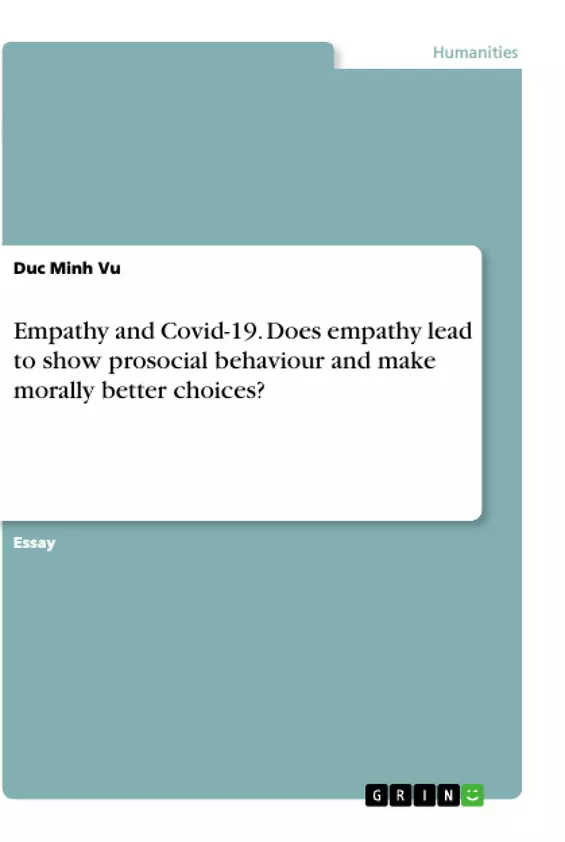This essay examines whether empathy leads both individuals as well as social groups to show prosocial behaviour and make morally better choices. “We have an empathy deficit.” That quote is from Barack Obama, the 44th President of the United States. Empathy refers to processes through which people respond to others’ emotions. Initially empathy was seen by the general population as something worth striving for. However, this view was recently challenged by the American psychologist Paul Bloom by stating “The problems we face as a society and as individuals are rarely due to lack of empathy. Actually, they are often due to too much of it.” Research indicates that individuals who make decisions based on empathy are often biased and irrational. According to this perspective increasing empathy in the population will not solve social problems, but rather have a negative effect on society.
Inhaltsverzeichnis (Table of Contents)
- Perspective-Taking and Empathy During COVID-19 Pandemic
- Empathy and Prosocial Behaviour
- Empathy and Moral Action
- Components of Empathy
- Perspective-Taking and Moral Decision
Zielsetzung und Themenschwerpunkte (Objectives and Key Themes)
This essay critically examines the claim that "the only problem with empathy is that we do not have enough of it." The essay explores the relationship between empathy and prosocial behavior, analyzing whether empathy leads individuals and social groups to make morally better choices. It also investigates the potential negative effects of empathy on moral action, considering the role of empathy in intergroup dynamics and individual decision-making.
- The relationship between empathy and prosocial behavior
- The potential negative effects of empathy on moral action
- The role of empathy in intergroup dynamics
- The distinction between empathy and compassion
- The importance of perspective-taking in moral decision-making
Zusammenfassung der Kapitel (Chapter Summaries)
- Perspective-Taking and Empathy During COVID-19 Pandemic: This chapter introduces the concept of empathy and its multifaceted nature. It explores the current understanding of empathy, highlighting its three key components: affective, cognitive, and motivational.
- Empathy and Prosocial Behaviour: This chapter presents evidence suggesting that empathy can have a positive impact on prosocial behavior. It cites research demonstrating a direct link between positive empathy and prosocial actions, emphasizing the role of affective and motivational components of empathy.
- Empathy and Moral Action: This chapter explores the potential negative influences of empathy on moral action. It highlights the spotlight nature of empathy, which can lead to bias and favoritism. The chapter discusses how empathy can contribute to intergroup dynamics and prejudices.
- Components of Empathy: This chapter delves into the different components of empathy, drawing upon research from social neuroscience and psychology. It distinguishes between affective empathy, which involves feeling the emotions of others, and cognitive empathy, known as perspective-taking, which involves understanding but not feeling those emotions.
- Perspective-Taking and Moral Decision: This chapter emphasizes the importance of perspective-taking in moral decision-making. Research suggests that perspective-taking, as opposed to affective empathy, can lead to better moral choices. The chapter highlights the need to distinguish between different aspects of empathy for a better understanding of its role in moral behavior.
Schlüsselwörter (Keywords)
Key terms and concepts explored in this essay include empathy, prosocial behavior, moral action, intergroup dynamics, compassion, perspective-taking, affective empathy, cognitive empathy, and moral decision-making. The essay also draws upon research findings and theoretical frameworks related to these concepts.
Frequently Asked Questions
Can there be "too much" empathy?
According to psychologist Paul Bloom, yes. He argues that empathy can lead to biased and irrational decisions, potentially causing more harm than good in social contexts.
What is the difference between affective and cognitive empathy?
Affective empathy involves actually feeling another person's emotions. Cognitive empathy, or perspective-taking, involves understanding their emotions without necessarily feeling them.
Does empathy always lead to morally better choices?
Not necessarily. The essay explores how empathy can act like a "spotlight," causing favoritism toward specific individuals while ignoring broader moral principles or the needs of larger groups.
How does empathy relate to intergroup dynamics?
Empathy can sometimes fuel prejudice or conflict between groups if it leads to intense favoritism for one's "in-group" at the expense of others.
Why is perspective-taking important in moral decision-making?
Research suggests that perspective-taking leads to more rational and fair moral choices compared to purely affective empathy, as it allows for a more detached understanding of the situation.
- Quote paper
- Duc Minh Vu (Author), 2020, Empathy and Covid-19. Does empathy lead to show prosocial behaviour and make morally better choices?, Munich, GRIN Verlag, https://www.grin.com/document/972563



